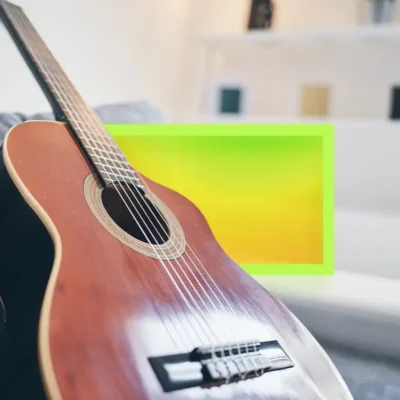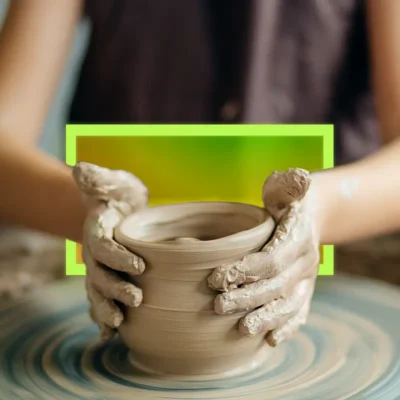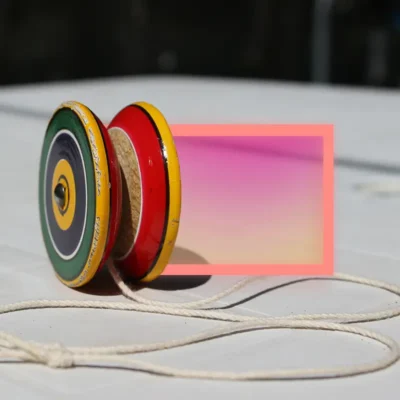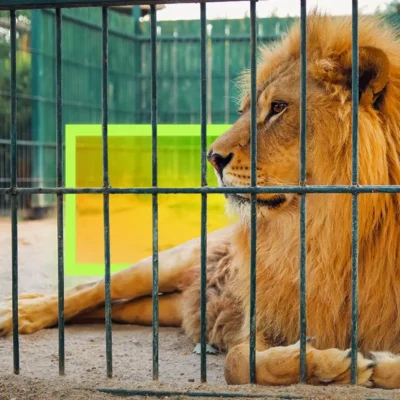Forging my own path
Writer Isha Sesay is happiest when she is caring for others; it’s a lesson she learns from her mother while growing up in Sierra Leone. But as an adult, there’s another lesson her mother teaches her, in quite another way: that even the most caring and giving among us must learn to receive help too. It’s through both giving and receiving that we become whole.
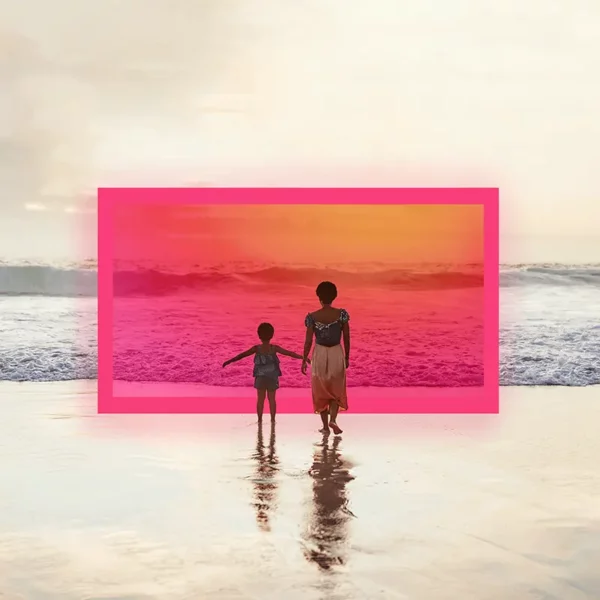
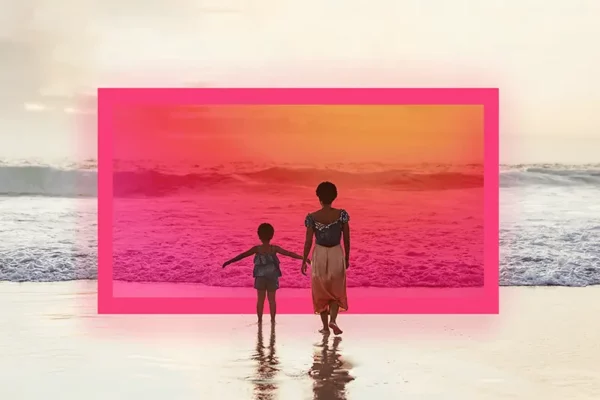
Table of Contents:
Transcript:
Forging my own path
ISHA SESAY: No one is invisible to my mother. Radiating energy and warmth, She’s drawn to supporting those who, at this moment, can’t stand on their own. I feel a glow of pride for her. I feel a glow of pride for her. I can see how helping others regenerates her.
ROHAN GUNATILLAKE: As a young student, Isha Sesay is happiest when she is caring: looking out for others around her, supporting those who need her help. It’s a lesson she learns from her mother, and it’s a theme that plays out in her adult life now, in her podcast, The Accidental Activist, and in her book, Beneath the Tamarind Tree: A Story of Courage, Family, and the Lost Schoolgirls of Boko Haram. But there’s another lesson her mother teaches her, in quite another way: That even the most caring and giving among us must learn how to receive help too. And the importance of both giving and receiving to help regenerate us.
In this series, we combine immersive first-person stories, breathtaking music, and mindfulness prompts so that we may see our lives reflected back to us in other people’s stories. And that can lead to improvements in our own inner lives.
From WaitWhat, this is Meditative Story. I’m Rohan, and I’ll be your guide.
The body relaxed. The body breathing. Your senses open. Your mind open. Meeting the world.
SESAY: I’m seven years old and perched on the brown and white sofa in our living room. I face the window and settle into my favorite activity: Watching people. The sun dips, casting a twilight tint across the sky. Our house is opposite the train station. I hear the brakes hiss and screech as a train pulls in. Commuters stream out, heading home. Observing them intrigues me. I live in northwest London, in Colindale. It’s a mixed, working-class community. Occasionally, I see Sierra Leoneans — like my family — heading home from the station.
Our house is a narrow bungalow, with a tiny living room. It’s government housing, similar to units many immigrant families live in. To me, it doesn’t feel cramped. It feels like a cocoon. I feel safe.
I‘m settling in here. We’re a close-knit community. My aunt Fatmata lives with us to help look after my brother and sister. I have friends. I have a routine. I’m a voracious reader.
Staring out the window, I’m searching for one particular face: my mother’s. I know she’ll be home from the university soon. She’s a linguist. She studies, and she cares for my siblings and me. My mom is my world.
Today, when she walks in the door she has big news. She’s taking my brother, sister and me back to Sierra Leone. She’s finished her PhD, so it’s is time to reunite with my dad, who works in Freetown, as an attorney. We’re moving in a matter of days.
It’s all so sudden.
I can’t imagine leaving Colindale. I learned to ride my bike here (and have the scar to prove it). My school. My friends. My tiny bungalow. My routine all gone. I know mom’s word is final.
I ask her, “What’ll happen to the library books that I’m supposed to return next week?” She’s clear, “Don’t worry about it, we’re going back home.”
I stare out my window into the only home I know, and I can sense that everything is about to change.
In Sierra Leone, Mrs. During takes me under her wing. She is dark, portly, and tall, with full cheeks. She dresses in large, flowing skirts. She’s warm and nurturing. At lunchtime, I stay in her cavernous classroom. It fits 40, but just the two of us face one another, seated at small wooden desks as she tutors me in maths. From this dim space, my gaze drifts to the window. I see the other students outside playing in the sun in their green and white gingham uniforms. I’m distracted by their laughter and screams.
Everything here feels foreign. But quickly I realize, that the foreigner is me.
The students in my new school bully me for not having grown up here. They pick on the way I speak, the way I eat, the games I play — everything I do reinforces my difference.
In the schoolyard this kid Prince, runs up and grabs my arm. He’s small for his age. His tight, reddy brown curls cling to his head. He takes a pencil and repeatedly stabs my arm, up and down. The sharp point digs deep into my skin. The pain blooms. Finally, he releases me, laughing wildly. I try to hold in my tears. I feel helpless. I think about telling someone, but one of my bullies is a teacher. I see similar things happening to other newcomers who arrive at my school. I recognize the sadness and neglect on their faces. We feel the isolation of being different. I begin to feel invisible. I start feigning illness so I can stay home from class. I don’t know how to raise my voice for myself or for others.
My mother doesn’t comfort me as much as she prepares me for more of this. She has been different much of her life, too. “Your path is your own,” she says to me, often.
GUNATILLAKE: This is a difficult moment, and a lonely time. Does it bring to mind any times from your life when you felt you did not belong? What advice would you give Isha and your younger self based on what you know now? Maybe something about holding the difficult less tightly? Or maybe something about using the power of your difference to do your own thing?
SESAY: To my mother, being different is a good thing. She gives me bright red shoes to wear at school that make me stand out. She dismisses the popular belief that “only loose women wear red shoes.” I love the shoes.
One afternoon on our way home from school, we stop at the outdoor market. Vendors hawk wide bins of fragrant fruit under the blazing sun. Papayas, bananas, oranges, mangoes. My mother is unusual among professionals here in that she often goes to the market herself, most simply send a member of their household to do the shopping.
A fruit seller approaches our car with her daughter in tow. “Why isn’t she in school?” my mother asks the woman. She replies, “We can’t afford it.” On the spot, my mother arranges to put the child through school herself. This is not the first time she’s done this, and will not be the last.
No one is invisible to my mother. Radiating energy and warmth, She’s drawn to supporting those who, at this moment, can’t stand on their own. I feel a glow of pride for her. By reaching out to those on the margins, she uses her resilience with purpose. I can see how helping others regenerates her.
And my perspective begins to shift. I sense that being “different” doesn’t mean being alone. We still live in a web of community.
At school I befriend those who haven’t settled in, who haven’t been welcomed. I have a sensitive radar to be aware of others who are bullied and excluded, and I feel drawn to them.
I walk along a dusty, unpaved road to Mrs. During’s house. She lives in Leicester Village on the outskirts of town. She agrees to tutor me not only during the lunch period but on weekends at her home. The soil is a rich, red-brown earth. I come to a portion of the path that is completely overgrown with dense, deep green foliage.
As I walk, I hear the cries of a girl in distress. Her wails pierce through the bush. I know where they come from: there is a house, out of view from the path, far from any other homes. I know of the family that lives there. Their child is disabled, and her parents don’t have the tools to help her. Here in this culture, children like her are sometimes called devils or bad spirits. She’s an outcast, made to be invisible.
When I hear her cries, my stomach twists. I think of my own sister, Jane, who suffers from cerebral palsy. My sister does not have language skills, so she has outbursts often. She’s unable to communicate her feelings, her frustrations, any other way. She lives in London, with my aunt, where she attends a government funded special needs school.
I have no way of helping the child who I can’t see but I can hear. But at home, I help Jane.
When visiting London for the summer holidays, I pick up Jane from the school bus. She can’t walk very well because her legs never fully strengthen, she struggles to descend the steps. I greet her, but she’s not able to respond. She is the eldest daughter of a linguist, but the way she was born left her without the ability to speak.
I place my arm around her waist, and physically support her on the walk home. She’s bigger than I am, and I feel her weighing down on me. The emotional weight of being her young caretaker feels just as heavy as the physical weight. I am protective of my sister. I have been there for her, and for my little brother. Caring for them is part of who I am. It’s not only an expression of love, but it fills me with love.
GUNATILLAKE: Do you recognize what Isha is saying here? Who have you cared for that regenerates you? Even though it often can be hard.
SESAY: I’m twelve years old when my father dies. It comes as a shock. I had known he was ill, but I never thought it could take his life.
I don’t know anyone else my age at school who has lost a parent. I feel more distanced from my peers than ever before.
My mother follows the mourning traditions of our Islamic faith. This means that, as a widow, she wears white and remains secluded indoors for 40 days. She remains in her bedroom. Those who come to pay their respects must visit her there. Her contact with the rest of us is. minimal.
This is the first time I have not had my mother readily, on hand. As I grieve my father’s death, I sense an internal shift, at 12 years old, that my world has changed, that I’ve grown up in an instant.
I draw on my mother’s strength, even if I can’t be near her, even if I can’t feel the warmth of her skin on mine, or breathe in the scent of her perfume when she envelops me in an embrace. The foundation of unconditional love that she’s given me is the source I tap into to carry on.
With my father’s death, my family unit is broken, but in this brokenness, I see more of my mother’s fortitude. After her mourning period, she refuses to marry. She says she never wants a man to tell her to get in the kitchen and cook. In our world, in the culture we are in, this is met with skepticism, and even criticism.
She is an academic, raising three children, and she is a warden for female students on campus, the person that they come to for guidance and mentorship. In giving of herself, I see how she, over time, is restored.
Sometimes, the example that my mother sets seems impossible to live up to.
I now understand the gifts of empathy. It takes me longer to understand the costs. I’m in the grocery store buying my own food for the first time. My mother is proud to be sending me off to Trinity College, Cambridge. But she has to start her lectures at her own university before my school year starts. She can’t come with me to school to help me set up my new life.
My yearning for my mother is an ache inside me. I’m putting items into my cart: milk, bread, cereal. In the frozen food aisle, something in my shield of armor starts to crack. I feel the tears breaking through, right there in the produce aisle.
There are times when I think, “It would be nice to be caretaken. To receive. But I don’t know how.
The emotions pour out of me: I see that choosing my own path can be hard and lonely. It feels good to have this release.
GUNATILLAKE: In today’s world, it often feels like we are rewarded when we give, give, give of ourselves. But what about the other side of that? Reflect on how you most need to receive, be taken care of. And as before, acknowledge what comes up.
SESAY: The college bar is the hub and the heart of campus life. My first time there, I’m cramped by the low ceilings and the hordes of students pressed in around me. A jukebox in the corner does its best to beat out the noise of the rowdy patrons. The place smells like stale Guinness. I feel claustrophobic.
Other students clink pints, and throw darts. We don’t have many shared experiences. I’ve never played lacrosse or rugby. I didn’t go to an elite private school. I’m not male. I’m not white.
I look around and I realize I don’t see a single other Black person at the bar.
My floormates, people who live next door to me and come from diverse backgrounds, don’t go to the college bar. They don’t feel welcome here. I start to think, “Something needs to change.”
I have been an outsider so many times in my life. This is a familiar feeling.
I run for office in the student council for the Women’s Officer position, to serve as a rep for women’s affairs. I want to help create space for women who feel marginalized and silenced by the academic and social practices within college life.
At the time it feels like everyone is ready to discount Black women students, but I am not willing to be discounted. I know my mother is proud.
The first year I run, I lose by a small margin. But the second year, I win.
It’s many years after Cambridge, after I’ve built my career as a journalist that one day, my mother, who has been driven her whole life, collapses. She suffers a debilitating stroke. No signs. No warnings. It’s the start of 6 years of hospitalization. I spend as much time with her as I can, traveling back and forth between countries and coasts. The woman who has always given is now in need of care. I rearrange my life so I can be here for her.
My whole life has been about forging my own path, being in control. She fashions that example for me over the years. She weaves within me a thick and enduring belief that obstacles cannot stand in my way.
Processing this drastic change in her health has taken everything in me. It’s sometimes exhausting work, filled with grief and resignation. What remains are the lessons she’s taught me my entire life about giving. But now there’s a new lesson, too: that we can’t control everything; that in the fallout of a disaster, we also need care.
So many of us give so much of ourselves to our work, to our families, to our side projects, if we are lucky, to our dreams.
But now my mother is teaching me by example again. But it’s not the gift she intended, or the one I wanted to gain. I’ve had to learn on my own the power of letting others care for me. In watching her become broken, I find myself unable to avoid my own vulnerability. I can’t just keep pushing my grocery cart by myself. I have no choice but to give myself over to help from family and friends. They advise me on medical care and provide much needed emotional support. I watch them become regenerated by helping me. And slowly, this gift of reciprocity transforms me.
When we give, it’s regenerative. Empathy is like love. It’s a renewable resource. You can’t tap out. But learning to receive is another, sometimes harder won lesson. Once again my mother is guiding me forward, this time into a softer, more whole version of myself.
Rohan’s closing meditation
GUNATILLAKE: Isha, thank you. That was so lovely. In her Meditative Story, “Life and love and the moment,” Arianna Huffington shares how her own mother’s wisdom and encouragement propels her forward. It gives her the foundation from which to take risks and pursue what might at first have felt out of reach. Follow the link in the show notes to hear Arianna’s own journey towards the University of Cambridge, and the sense of adventure she develops along the way.
Ok. A big part of what I heard from Isha’s story was that while giving selflessly can be regenerative, there are times that we just need to receive. So that is what we’ll explore together.
And as we often do, let’s take some time to settle in and settle down.
Enjoying our outbreaths.
Putting aside any planning thoughts or any other persistent patterns of thinking for now, there’s plenty of time for them later on.
And just enjoying being here.
Body soft.
Enjoying the afterglow of Isha’s story.
And any calm, or delicateness or stability that might be here.
Leaning into those sensations.
Welcoming any pleasure that is here, and making the space for it to spread.
And what we’re going to do together for the rest of our time is what I think of as an inverse kindness meditation. I’ve sort of just made it up so let’s see how we get on.
Every day, thousands and thousands of people around the world do loving kindness meditation. We’ve done it before on this show, sending out thoughts of kindness and well wishing to people around them. And that includes us. So out there, in the air, metaphorically (and literally if you like) are thoughts and wishes and vibes and energies of so many people and they’re there for you. So let’s receive them.
With hands soft and eyes soft, allows your awareness to be open and wide.
Not focussing on anything in particular but tuning more into space, a field of experience.
And we’ll allow the kindness of others in.
It’s always here, available, waves of kindness and well-wishing.
Some originating from nearby, some from the other side of the world.
Imagining the kindness, the love of others being a field in which we are.
And allowing it in.
Allowing it to warm us.
No need for barriers.
Our skin, porous to the kindness of others.
Resting the awareness, if you can, in the areas of the heart, in and around the chest.
And noticing what is here.
It’s ok for things to feel tight if that’s here.
It’s ok to feel tender.
It’s ok to feel whatever is here, what is happening is happening.
The kindness of others, built up over years and years of loving-kindness meditation practiced around the world, and available for us to receive.
Because it is for us.
Isha is right. When we give of ourselves, over time we are restored. But it does drain us and there are times we need to look after ourselves.
In fact that is probably all the time.
Being able to receive the kindness of others can be a training when we are so used to being the one doing the giving.
It can feel sometimes like we don’t deserve the kindness of others and it’s incumbent on us to do everything.
We do deserve it and it’s not incumbent all on us.
And in my experience, being in control can be a bit of an illusion and so we need all the help can get.
Thank you Isha for reminding me of that, and inspiring me to invent a new meditation!
Go well. You deserve it.


